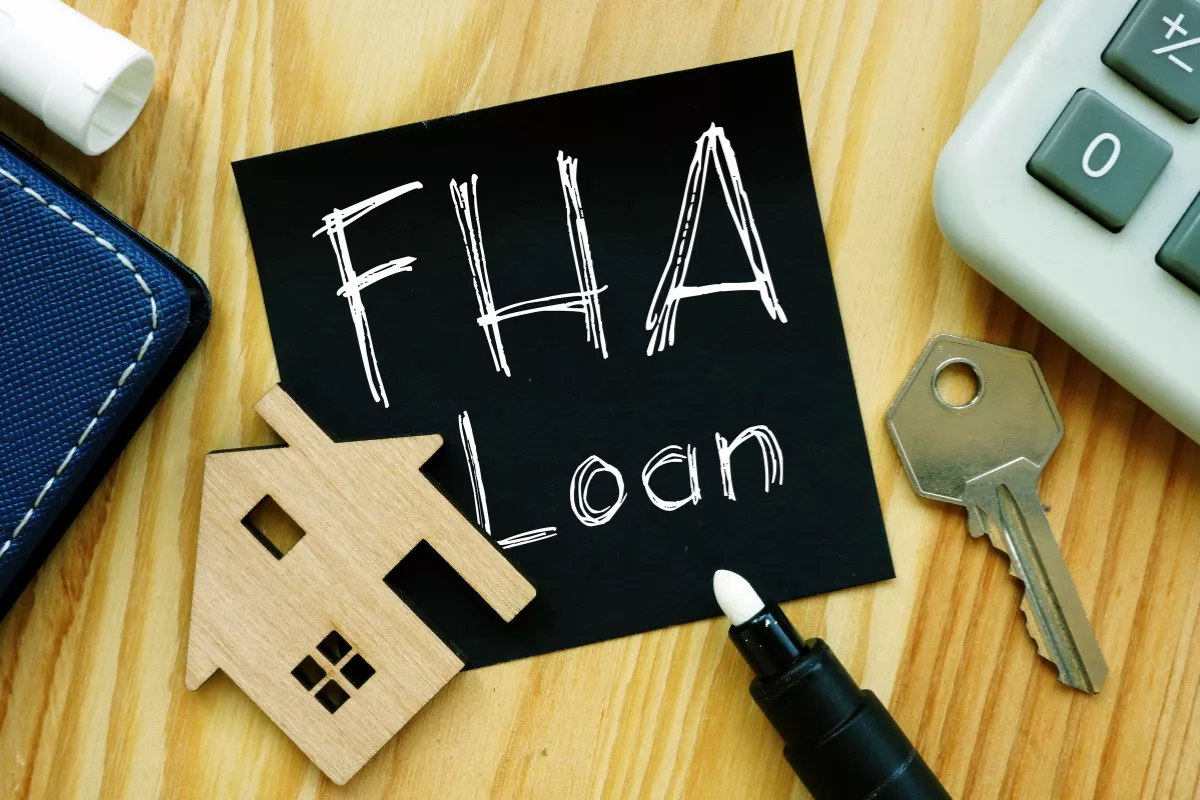Embarking on the journey of buying a home can introduce you to various financing options, among which you may find FHA loans mentioned frequently. "FHA" stands for the Federal Housing Administration, and this type of loan could be particularly beneficial if you have existing debt or a lower credit score.
FHA loans are accessible even to those who have faced financial setbacks such as bankruptcy, offering a pathway to homeownership under circumstances that might disqualify them from other types of financing.
FHA loans are designed to reduce the barriers to homeownership, providing several benefits that are attractive to individuals who may not qualify for conventional mortgage arrangements.
This blog will delve into the workings of FHA loans, including their requirements, the various types available, and both the advantages and potential drawbacks. We aim to address common queries and equip potential buyers with the knowledge to decide if an FHA loan meets their homebuying needs.
What is an FHA Loan?
FHA stands for the Federal Housing Administration, a government agency that provides mortgage insurance. Established during the post-Great Depression era, it was introduced at a time when achieving homeownership was extremely difficult due to high costs and many Americans' inability to secure loans because of insufficient savings and poor credit histories.
In response, the government began backing more accessible mortgages, leading to approved lenders offering FHA loans with more lenient down payment and credit score requirements.
Today, these government-backed mortgages continue to provide a safety net to lenders since they are guaranteed by the FHA. This guarantee reduces the financial risks if a borrower defaults, enabling lenders to adopt more flexible qualifying criteria.
As a result, FHA loans are particularly viable for middle and low-income borrowers who might not qualify for conventional loans. Although these loans are insured by the government and issued by FHA-approved lenders like Better Mortgage, each lender might have its own specific qualification criteria, and while FHA guidelines provide a basic framework, the exact requirements must be verified with your chosen lender.
Who Qualifies for a FHA loan
Key qualifying factors for an FHA loan include a credit score starting at 500, which significantly influences your down payment amount and interest rates—the higher your credit score, the lower your down payment and more favorable your interest rate. The debt-to-income ratio (DTI) should be at or below 43%, allowing lenders to compare your earnings against your debt payments more flexibly.
Applicants must provide stable income and employment verification, typically requiring at least two years of documentation. Down payment requirements range from 3.5% to 10%, generally lower than those for conventional loans, depending on your credit score and the lender's policies.
Properties must also meet specific FHA appraisal standards, and there are maximum borrowing limits, which vary by county and reflect local market costs; for instance, the highest FHA loan limit in 2021 is $822,375, but current limits should be confirmed via HUD resources.
FHA Loan Requirements
To qualify for an FHA loan, borrowers must adhere to specific criteria: the property in question must be appraised by an FHA-approved appraiser and it can only be your primary residence, not an investment property or second home.
Additionally, you are required to move into the property within 60 days of closing. An inspection is mandatory to ensure the property meets FHA's minimum property standards. Other important qualifications include the down payment amount, mortgage insurance, credit score, loan limits, and income requirements, all of which we will examine in further detail below.
1. Credit Score Requirements
FHA loans are known for having lower credit score requirements than many conventional loans. The specific credit requirements are:
- Minimum Credit Score of 500: With a credit score of 500-579, you might be eligible for an FHA loan, but you will typically need to make a 10% down payment.
- Credit Score of 580 and above: Eligible for as low as 3.5% down payment.
2. Down Payment
The down payment amount varies based on your credit score:
- 3.5% Down Payment: For borrowers with a credit score of 580 or higher.
- 10% Down Payment: For borrowers with a credit score between 500 and 579.
3. Mortgage Insurance
- Upfront Mortgage Insurance Premium (UFMIP): Equal to 1.75% of the loan amount, paid at the time of closing but can be financed as part of the loan.
- Annual Mortgage Insurance Premium (MIP): This fee varies depending on the loan amount, loan-to-value ratio, and term of the loan. Typically, it ranges from 0.45% to 1.05% of the loan amount per year, paid monthly.
4. Debt-to-Income Ratio (DTI)
FHA loans generally allow a higher DTI ratio than conventional loans. The maximum DTI ratio typically allowed is:
- 43% DTI: This is the standard maximum for most FHA loans, although some lenders may permit higher DTI ratios up to 50% with strong compensating factors such as large cash reserves or a high credit score.
5. Property Requirements
- FHA Appraisal: The property must undergo an FHA appraisal and meet certain safety, security, and structural standards.
- Primary Residence: FHA loans are only eligible for primary residences, not investment properties or second homes.
6. Employment History
Lenders usually require a steady employment history for the last two years, or a stable work history in the same industry.
7. Loan Limits
FHA loan limits vary by location and are updated annually. They are typically set based on the local housing market conditions. These limits ensure that the loan amounts are in line with housing prices in a given area.
8. Other Considerations
- Bankruptcy and Foreclosure: Applicants with a bankruptcy or foreclosure in their history are not disqualified, but they must have re-established good credit and met waiting period requirements—typically two years for bankruptcies (Chapter 7) and three years for foreclosures.
- First-Time and Repeat Buyers: FHA loans are available to both first-time homebuyers and those who have previously owned homes.
Types Of FHA Home Loans
FHA loans provide a variety of options tailored to different needs and situations, allowing broader access to homeownership and property improvements. Here’s a closer look at the different types of FHA home loans available:
1. Traditional Mortgage
This is the standard FHA loan used for purchasing pre-existing homes. It's an attractive option for first-time homebuyers or those who do not meet the stricter requirements of conventional mortgages due to its lower down payment and credit score requirements.
2. FHA 203(k)
The FHA 203(k) loan is particularly valuable for buyers interested in purchasing a home that needs repairs or renovations. This loan combines the purchase price of the home and the cost of renovations into a single mortgage. This allows homeowners to finance the repairs and improvements over time, under one FHA-backed loan, rather than having to obtain separate financing for the home purchase and subsequent renovations.
3. FHA Energy-Efficient Mortgage (EEM)
The Energy-Efficient Mortgage program is designed to help homeowners save money on their utility bills by financing energy-efficient improvements as part of their FHA loan. Eligible improvements might include better insulation, solar panels, or more efficient heating and cooling systems, all of which are assessed to determine if the cost savings outweigh the initial investment.
4. Home Equity Conversion Mortgage (HECM)
HECM, or reverse mortgage, is targeted at seniors (homeowners aged 62 or older) who have substantial equity in their homes. It allows them to convert this equity into cash without having to sell the home or take on additional monthly bills. The loan balance is not due until the home is sold or the owner passes away, making it a strategic option for income supplementation in retirement.
5. FHA Section 245(a)
Section 245(a) is the Graduated Payment Mortgage (GPM) program. It's designed for borrowers who expect their incomes to increase over time. This loan starts with lower initial monthly payments that gradually rise according to a predetermined schedule. The GPM can be a smart choice for young professionals anticipating career and salary growth.
How Hard Is It to Get an FHA Loan?
Obtaining an FHA loan is often seen as easier than securing a conventional mortgage because it has more lenient credit requirements and lower down payment options. While conventional mortgages generally require a credit score of 620 or higher, FHA loans are available to those with credit scores as low as 500.
If your credit score is 580 or higher, you could qualify to make a down payment of just 3.5%. FHA loans also offer competitive interest rates. However, the application process for an FHA loan involves extensive documentation and adherence to strict property standards.
Advantages and Downsides to FHA Loans
FHA loans are designed to make homeownership more accessible, especially for those with limited savings and lower credit scores. These loans are particularly appealing to first-time homebuyers who might benefit from lower down payment requirements.
However, it's important to carefully consider both the advantages and disadvantages before committing to any mortgage. Here is an overview of the pros and cons associated with FHA loans:
Pros
- Low Down Payment: FHA loans require as little as 3.5% down, which can significantly reduce the upfront costs of buying a home.
- Lower Credit Score Requirements: FHA loans are accessible to borrowers with credit scores as low as 500, making them a feasible option for those who may not qualify for conventional loans.
- Higher DTI Acceptance: FHA loans are more lenient with debt-to-income ratios, allowing qualifications at or below 43% DTI, which helps those with existing debts.
- No Income Limitations: Unlike some loan programs, there are no maximum income limits with FHA loans, broadening eligibility.
Cons
- Mandatory Mortgage Insurance Premiums (MIP): To offset the risks to lenders, FHA loans require borrowers to pay Mortgage Insurance Premiums either for 11 years or for the life of the loan, depending on the size of the down payment.
- Perceived as Less Competitive: In competitive housing markets, sellers may prefer offers with conventional financing over FHA loans, potentially putting FHA borrowers at a disadvantage.
- Stricter Property Standards: FHA loans require properties to meet stringent standards, which can disqualify some homes but ensures buyers are less likely to face costly repairs.
- Loan Limits: FHA loan limits are generally lower than those for conventional loans, which might restrict buying power in more expensive markets.
People also ask
Can I buy an investment property with an FHA loan?
No, FHA loans are designed primarily for financing a primary residence and are not suitable for investment properties.
How long do I have to pay the mortgage insurance?
For loans with less than a 10% down payment, mortgage insurance is required for the life of the loan.
Can I refinance an FHA loan?
Yes, the FHA offers several refinance options for existing FHA loans and even for converting a conventional loan to an FHA loan.

 Marcio Vasconcelos
Marcio Vasconcelos





